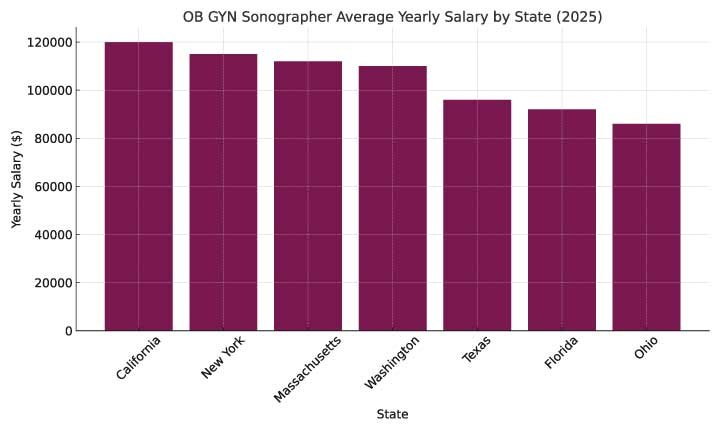OB GYN sonographer salary is one of the most searched topics among aspiring ultrasound professionals and for good reason. This career combines medical skill, emotional connection, and the chance to be part of life’s most personal milestones. From capturing a baby’s first image to helping diagnose women’s health concerns, OB GYN sonographers play a vital role in patient care.
But beyond the purpose-driven nature of the job, many wonder: How much does it actually pay?
In this guide, we break down the hourly, monthly, and yearly earnings of OB GYN sonographers across the United States. We’ll explore how salary changes with experience, location, and work setting—giving both students and professionals a clear picture of what to expect and how to grow financially in this rewarding field.
Table of Contents
ToggleWhat is an OB GYN Sonographer?
Before diving into the dollars, let’s briefly explain the role. OB GYN sonographers specialize in imaging of the female reproductive system. They:
-
Perform ultrasounds during pregnancy
-
Evaluate fetal growth and development
-
Detect abnormalities
-
Monitor ovaries, uterus, and other pelvic structures
These professionals typically work in hospitals, private clinics, OB/GYN offices, or outpatient imaging centers. With advancing technology and a growing demand for women’s health services, the need for OB GYN sonographers continues to rise.
How Much Do OB GYN Sonographers Make?
Let’s talk real numbers. OB GYN sonographer salaries vary depending on factors like location, credentials, and experience. But on average:
| Experience Level | Hourly Wage | Monthly Salary | Yearly Salary |
|---|---|---|---|
| Entry-Level (0–2 years) | $28 – $35 | $4,800 – $6,000 | $58,000 – $72,000 |
| Mid-Level (3–7 years) | $36 – $45 | $6,200 – $7,800 | $75,000 – $94,000 |
| Senior (8+ years) | $46 – $58 | $8,000 – $10,000 | $97,000 – $120,000 |
💡 Note: These ranges are approximate and based on current national averages in 2025.
These numbers are strong compared to many healthcare jobs that don’t require a full medical degree. With only 2 years of specialized training, many OB GYN sonographers start earning above the national average wage.
OB GYN Sonographer Salary by Work Setting
Not all jobs pay the same. Here’s how work environment can affect salary:
| Work Setting | Average Hourly | Annual Salary Range |
|---|---|---|
| Private OB/GYN Clinic | $35 – $44 | $72,000 – $91,000 |
| Hospital (Outpatient/Inpatient) | $38 – $52 | $79,000 – $108,000 |
| Diagnostic Imaging Centers | $36 – $49 | $74,000 – $102,000 |
| Mobile Ultrasound Services | $32 – $45 | $67,000 – $93,000 |
| Government / Military Hospitals | $40 – $55 | $84,000 – $114,000 |
Hospitals and federal facilities often offer higher pay, better benefits, and more structured work hours. Private clinics may provide a more relaxed environment but with slightly lower compensation. Mobile sonographers, meanwhile, enjoy flexibility but may sacrifice consistent income.
Real-Life Example: Maria’s Story
Maria, a 32-year-old OB GYN sonographer in Texas, started her career six years ago after completing a two-year associate’s program. Her first job paid $30/hour at a small OB/GYN office. With time, additional certifications, and a transition to a large regional hospital, she now earns $45/hour and works four 10-hour shifts per week.
“What I love most isn’t just the paycheck—it’s the connection with patients. But the pay growth has been motivating. It shows that hard work and experience do pay off in this field,” Maria says.
Stories like Maria’s highlight how salary isn’t fixed. With the right moves, OB GYN sonographers can significantly increase their income over time.
Also Read:
OB GYN Sonographer Salary Progression: 10-Year Outlook
Let’s look at what a typical career path might yield financially:
| Years of Experience | Hourly Pay | Yearly Pay (Est.) |
|---|---|---|
| 1 Year | $30 | $62,400 |
| 3 Years | $38 | $79,040 |
| 5 Years | $42 | $87,360 |
| 7 Years | $47 | $97,760 |
| 10+ Years | $55+ | $114,400+ |
With each year of experience, not only do salaries rise—but so do opportunities for specialization, travel assignments, and leadership roles.
5-Year Growth Trend of OB GYN Sonographer Salaries (2021–2025)

Hourly vs. Salary: What Should You Expect?
Most OB GYN sonographers are paid hourly, especially in clinical or hospital settings. However, some full-time positions may offer salaried roles with guaranteed hours and benefits like:
-
Paid vacation
-
Health insurance
-
Retirement contributions
-
Continuing education stipends
If you work per diem or part-time, you might earn a higher hourly rate, but without benefits. It’s a trade-off some sonographers are happy to make for flexibility.
OB GYN Sonographer Salary by State (Top 20 States)
Here’s a snapshot of what OB GYN sonographers are earning in different U.S. states. These figures represent average annual salaries as of 2025, including both public and private settings.
| State | Hourly Pay | Monthly Pay | Annual Salary |
|---|---|---|---|
| California | $52 – $60 | $9,100 – $10,400 | $110,000 – $125,000 |
| New York | $48 – $58 | $8,300 – $10,000 | $100,000 – $120,000 |
| Massachusetts | $46 – $55 | $8,000 – $9,500 | $96,000 – $114,000 |
| Washington | $45 – $54 | $7,800 – $9,300 | $94,000 – $112,000 |
| Oregon | $44 – $52 | $7,600 – $9,000 | $91,000 – $108,000 |
| Illinois | $42 – $51 | $7,300 – $8,800 | $88,000 – $106,000 |
| Colorado | $41 – $50 | $7,100 – $8,700 | $86,000 – $104,000 |
| Arizona | $40 – $49 | $6,900 – $8,500 | $84,000 – $102,000 |
| Texas | $38 – $48 | $6,600 – $8,300 | $80,000 – $100,000 |
| Florida | $36 – $46 | $6,200 – $8,000 | $75,000 – $96,000 |
| Georgia | $35 – $45 | $6,000 – $7,800 | $72,000 – $94,000 |
| North Carolina | $34 – $44 | $5,800 – $7,700 | $70,000 – $92,000 |
| Pennsylvania | $36 – $45 | $6,200 – $7,800 | $74,000 – $94,000 |
| Michigan | $34 – $43 | $5,800 – $7,400 | $69,000 – $89,000 |
| Ohio | $33 – $42 | $5,600 – $7,200 | $67,000 – $86,000 |
| Tennessee | $32 – $41 | $5,400 – $7,100 | $65,000 – $85,000 |
| Indiana | $31 – $40 | $5,300 – $6,900 | $63,000 – $83,000 |
| Missouri | $30 – $39 | $5,200 – $6,800 | $61,000 – $81,000 |
| Alabama | $29 – $38 | $5,000 – $6,700 | $59,000 – $80,000 |
| Mississippi | $28 – $36 | $4,800 – $6,300 | $56,000 – $76,000 |
💡 Tip: High-cost-of-living states like California and New York offer higher salaries, but don’t forget to factor in expenses like rent, insurance, and commuting.
OB GYN Sonographer Average Yearly Salary by State

How Certifications Impact Salary
If you’re aiming for the top of the pay scale, certifications matter.
Must-Have:
-
ARDMS Certification (American Registry for Diagnostic Medical Sonography) in Obstetrics and Gynecology (OB/GYN specialty)
Nice-to-Have:
-
NT Certification (Nuchal Translucency)
-
Fetal Echocardiography credential
-
CPR/BLS/ACLS (for hospitals and emergency units)
Sonographers who hold multiple specialties or advanced credentials often earn 10–15% more than their peers. Hospitals especially favor certified professionals when offering promotions or raises.
OB GYN Sonographer vs. General Diagnostic Sonographer Salaries
Many people ask, “Do OB GYN sonographers make more than general sonographers?” The answer: Yes, often—but not always.
Here’s a quick comparison:
| Specialization | Average Hourly | Annual Average |
|---|---|---|
| OB GYN Sonographer | $40 – $55 | $82,000 – $114,000 |
| General Sonographer | $35 – $48 | $75,000 – $100,000 |
| Vascular Sonographer | $38 – $52 | $78,000 – $108,000 |
| Cardiac Sonographer | $40 – $56 | $84,000 – $118,000 |
OB GYN sonographers tend to benefit from routine patient volume, particularly in high-population areas, and can build long-term relationships with OB clinics—leading to more job stability and potential bonuses.
Bonuses, Perks, and Overtime Pay
Besides your base pay, OB GYN sonographers often enjoy:
-
Overtime Pay: Some clinics and hospitals pay 1.5x after 40 hours/week
-
On-Call Bonuses: $100–$300 per shift
-
Performance Bonuses: Often tied to patient load, satisfaction scores, or holiday shifts
-
Shift Differentials: Evening/night/weekend shifts may pay 10–20% more
-
Tuition Reimbursement: Some employers cover part of continuing education costs
-
Sign-On Bonuses: Up to $5,000 in high-need areas
📌 Real Insight: A sonographer working night shifts in California shared they earn an extra $7/hour just for working evenings—adding nearly $1,100 a month to their take-home pay.
Career Flexibility and Growth = Higher Income
One of the most appealing things about being an OB GYN sonographer? You can grow both laterally and vertically.
Options that lead to higher salaries:
-
Moving into lead sonographer or supervisor roles
-
Teaching in ultrasound programs or colleges
-
Taking travel sonographer contracts (these often pay $2,000+ per week)
-
Transitioning into ultrasound equipment sales
-
Opening a mobile ultrasound business
You’re not stuck. In fact, most OB GYN sonographers enjoy more control over their earnings and schedules than many other allied health careers.
OB GYN Sonographer Salary: Job Satisfaction, Challenges & Career Value
Salary is one side of the story—but how does the actual experience of being an OB GYN sonographer hold up? In this final section, we’ll look at job satisfaction, common challenges, work-life balance, and whether the return on investment for this career makes sense in 2025 and beyond.
Is It Worth Becoming an OB GYN Sonographer?
Let’s address the question that many prospective students and career changers are asking: Is this career worth it financially and emotionally?
The answer, for many, is a resounding yes.
Why It’s Worth It:
-
Fast-track education: Most sonographers begin working after a 2-year accredited program.
-
Good salary potential: Starting pay is solid, and growth is steady.
-
High demand: Women’s health is an essential, ongoing need. OB GYN clinics are rarely out of patients.
-
Emotional reward: You’re part of some of the most joyful (and sometimes difficult) chapters in people’s lives.
-
Flexible options: You can work full-time, part-time, per diem, or travel.
Many OB GYN sonographers report a strong sense of purpose. You’re not just scanning body parts—you’re supporting pregnancy journeys, giving peace of mind, and playing a critical role in diagnosis.
Challenges You Should Know About
Like any healthcare job, it’s not all ultrasound gel and happy tears. There are challenges that come with the territory.
1. Emotional Pressure
-
Sonographers often spot fetal abnormalities or pregnancy complications before anyone else.
-
It can be emotionally draining to deliver concerning news or remain quiet while waiting for a physician to explain.
2. Repetitive Stress Injuries
-
The job requires extended periods of holding transducers at awkward angles.
-
Over time, this can lead to wrist, shoulder, or neck issues—especially without proper ergonomics.
3. Tight Scheduling
-
Some OB clinics pack in 20–30 patients per day.
-
You may be on your feet for hours with minimal breaks.
4. Shift Demands
-
Hospitals may require night or weekend shifts.
-
Emergency OB scans during off-hours can be stressful and time-sensitive.
Despite these hurdles, many sonographers say the rewards outweigh the challenges—especially when patients come back with thank-you cards, baby pictures, or simply relief in their eyes.
Work-Life Balance: How Does It Stack Up?
Work-life balance can vary based on setting. Let’s break it down:
| Work Setting | Schedule Type | Work-Life Balance |
|---|---|---|
| OB/GYN Clinic | Weekdays, regular hours | Great |
| Hospital (24/7 care) | Rotating, nights/weekends | Moderate |
| Travel Sonographer | Temporary contracts, flexible | Good (but with relocation) |
| Mobile Services | Self-managed hours | Excellent (but variable) |
If you prefer a 9–5 lifestyle with minimal disruption, OB/GYN offices are ideal. If you enjoy variety, flexibility, or higher pay, travel and mobile roles might be better suited.
Education Cost vs. Salary Return
Another important factor is the return on your educational investment.
Average Cost of Education:
-
Community College or Technical School (2-year program): $8,000 – $25,000 total
-
Private Ultrasound School (1–2 years): $25,000 – $45,000 total
Compare that with a starting salary of $60,000 – $70,000, and it becomes clear: you can earn back your tuition within the first one to two years of working.
Real ROI Example:
Tanya, a 29-year-old OB GYN sonographer in North Carolina, completed a $12,000 associate’s program. Her first full-time job paid $32/hour. After just 18 months, she had paid off her student loan and began saving for a house.
“I didn’t need to take on six figures of debt. I got into a stable, respected medical field and I love what I do. That’s a win in my book,” she said.
Who Should Consider This Career?
Becoming an OB GYN sonographer is a solid path for people who are:
-
Empathetic and good with emotional situations
-
Detail-oriented, especially with image interpretation
-
Comfortable with anatomy and health science
-
Looking for job security without medical school debt
-
Interested in meaningful, patient-centered work
If this sounds like you, then you’re likely to thrive—not only financially but personally.
Final Thoughts: Is the OB GYN Sonographer Salary Enough?
With hourly wages between $30 and $60, strong job demand, and a meaningful day-to-day role, OB GYN sonography offers one of the most balanced healthcare careers in terms of salary, stability, and emotional reward.
The hourly, monthly, and yearly earnings we explored show that with just 2 years of education and some hands-on training, you can step into a well-paying, future-proof field. And depending on where you live—or where you’re willing to go—you can significantly boost your income through specialization, travel roles, or advanced certifications.
So, whether you are at the start of your journey or considering a change, take heart in knowing that this is a career where the numbers add up—and so does the meaning behind them.
Also Read:
FAQs:
How much does an OB GYN sonographer make an hour?
OB GYN sonographers typically earn between $30 and $60 per hour, depending on experience, location, and certifications. Entry-level positions may start closer to $28–$35/hour, while those with advanced credentials or working in high-paying states like California or New York can earn up to $60/hour. Hospitals, travel roles, and night shifts often offer higher hourly rates due to demand and scheduling needs.
What is the average yearly salary for an OB GYN sonographer?
The average annual salary for an OB GYN sonographer ranges from $75,000 to $114,000, depending on geographic location, work setting, and experience. Sonographers in large hospitals or federal facilities tend to earn more than those in private clinics. Certifications like ARDMS and specialties such as fetal echocardiography can also boost yearly earnings significantly. Travel sonographers may earn even higher through contract bonuses and overtime.
Which state pays OB GYN sonographers the most?
California consistently ranks as one of the top-paying states for OB GYN sonographers, with annual salaries often exceeding $120,000 in urban areas like San Francisco or Los Angeles. Other high-paying states include New York, Massachusetts, and Washington. These regions offer higher pay but often come with increased living costs, so it’s important to factor in housing, taxes, and lifestyle expenses when evaluating take-home value.
Do OB GYN sonographers get paid overtime or bonuses?
Yes, many OB GYN sonographers receive overtime pay, bonuses, and shift differentials. Overtime is typically 1.5 times the regular hourly rate. Some employers also offer on-call bonuses, holiday pay, performance incentives, and even sign-on bonuses in high-demand areas. Evening or weekend shifts may pay more per hour, making it possible to increase your monthly income significantly depending on your schedule and setting.
Is becoming an OB GYN sonographer a good career choice?
Absolutely. OB GYN sonography offers a high-paying, emotionally rewarding, and stable career path. With just 2 years of education, professionals can earn over $70,000 annually and enjoy consistent job demand. The role allows for meaningful patient interaction, career growth, and flexible work options. It’s an excellent choice for those looking to work in women’s health without going through years of medical school.
How long does it take to become an OB GYN sonographer?
It typically takes 2 to 3 years to become an OB GYN sonographer. Most professionals complete an accredited associate’s degree or certificate program in diagnostic medical sonography, followed by ARDMS certification with a focus on obstetrics and gynecology. Some programs include internships or clinical rotations, giving students real-world experience before entering the job market. Fast-track options may also be available for those with prior healthcare experience.
Disclaimer: All salary figures on this site are based on publicly available sources, industry averages, and past trends. Actual salaries may vary depending on your location, specialization, experience, education, and employer. These estimates are provided for informational purposes only and do not guarantee specific outcomes.”

